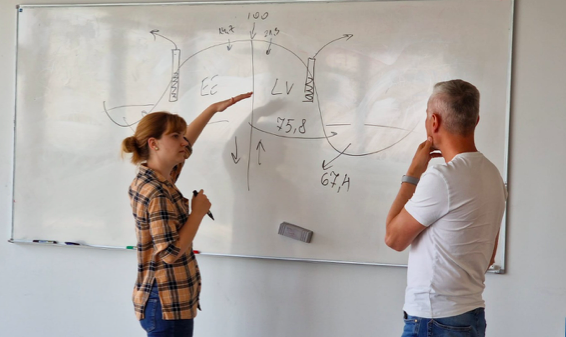Marlen Hunt (Ph.D. student and new worker at EU-WATERRES project partner – Geological Survey of Estonia (GSE) explains the groundwater modelling process to her mentor – Head of the Department of Hydrogeology and Environmental Geology at GSE, Andres Marandi.
When asked about our collaboration with young people in project implementation, we enthusiastically say “yes” while considering our own involvement. But on closer observation, we may find that our notion of ‘young people’ differs from the official definition. Consequently, the presence of young professionals in our midst might not be as substantial as we desire. Why does this disparity exist? It’s easy to attribute it solely to the belief that young people are disinterested in work that doesn’t yield substantial income. However, this is only a partial truth.
Today’s young minds who choose environmental sciences as their career path are acutely aware of the critical issues that will challenge humanity in the next 30 – 50 years. They exhibit tremendous enthusiasm and activity during their studies. So, why are they seemingly absent in workplaces? One significant factor contributing to this scenario is the prevalence of unpaid internships offered by employers. Students have real-life expenses and cannot solely dedicate themselves to parties, and they want to be independent. Therefore, working solely on projects often cannot provide long-term safety. Unfortunately, this aspect often goes unnoticed by many employers. On the other hand, from the employer’s perspective, staff often follows the project and in periods of reduced financing (what we experienced between every project call) employers cannot afford extra job positions for less experienced youth.
Secondly, funding applications are assessed based on the institution’s experience and the project team’s or the project manager’s potential. While this is understandable from a funding perspective, it does restrict young people’s access to implementing ambitious ideas. There are indeed funds exclusively dedicated to young researchers, but the competition is fierce. Moreover, the potential mentors constantly fight for funding sources for their team and have little time to dedicate to the new members. Unfortunately, it often leads to leaving academia and similar workplaces as the young ones feel lost and unsupervised (especially if we compare with the industry sphere with bonus programs, team building activities, constant pay raise, etc.).
Effecting change requires systemic transformations. However, for these changes to occur, they must originate at the root. Experienced professionals must willingly embrace and involve young individuals in their activities, even if it means allowing room for mistakes, which are an integral part of the learning process. We mustn’t retreat to our isolated realms but instead, feel the responsibility to share our knowledge and experience, even if it may be challenging. Also, the employers must understand that experience exchange is not solely the mentor’s responsibility and should find a way how to ease the process for everyone. As with many other challenges we encounter, communication and awareness are the keys to change. We must change and seek young colleagues otherwise some professions may extinct. It is imperative that we exhibit empathy and understanding towards young people who are yet to demonstrate their knowledge and creativity, which often has the potential to astonish us.


